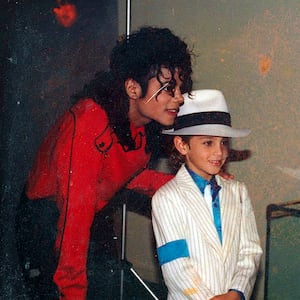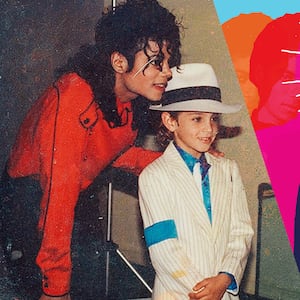The premiere of Leaving Neverland at the Sundance Film Festival in January necessitated an unprecedented police presence. Critics, journalists, and industry insiders who attended the screening of the four-hour, two-part documentary, focused on two men who claim they were sexually abused by Michael Jackson, were encouraged to arrive earlier than usual. After crossing a phalanx of officers that lined Main Street, each attendee was patted down individually, while bomb-sniffing dogs repeatedly patrolled the aisles of the Egyptian Theater.
“Tensions are higher for this movie than anything I’ve ever seen at Sundance before,” one law enforcement officer told Deadline ahead of the screening. Direct threats were reportedly made against Leaving Neverland director Dan Reed. The primary concern was over a possible incident inside the screening, but Park City Police also prepared for a massive protest outside the venue from Michael Jackson fans—one might call them “truthers”—who maintain the pop star’s innocence in all accusations of child sexual abuse and notoriously organize themselves against anyone who questions it.
In the end, only a handful of protesters braved the Park City cold the morning of the premiere, which garnered snickers from some who wondered if the massive security production was an overreaction. But then journalists and critics started to publish their pieces on the documentary and were awakened to the reality that, when it comes to Michael Jackson truthers, maybe there isn’t such a thing as overreacting to this hive.
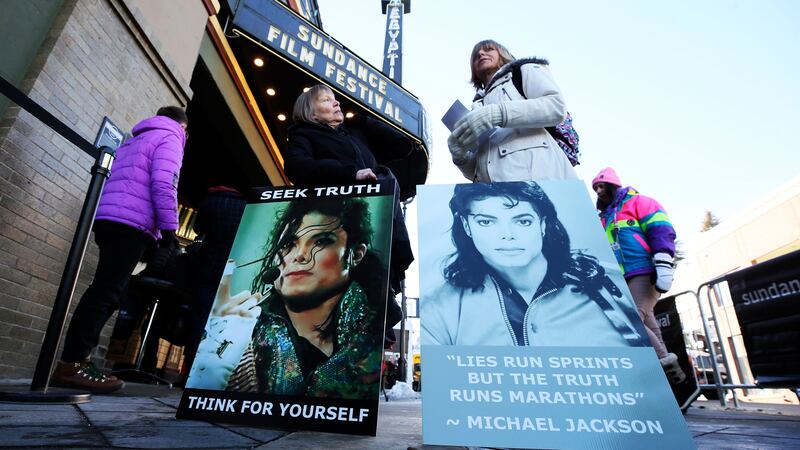
Pro-Michael Jackson protesters outside the Sundance premiere of 'Leaving Neverland' on Jan. 25, 2019, in Park City, Utah.
Danny Moloshok/APThe first part of Leaving Neverland premieres Sunday night on HBO. The film features two accusers: Wade Robson, known to many as the famous choreographer for Britney Spears and NSYNC and who got his start as a child Michael Jackson impersonator, and James Safechuck, who starred in one of Jackson’s famous Pepsi commercials in the ‘80s.
Robson and Safechuck recount in disturbing detail alleged incidents of masturbation, kissing, oral sex, being forced to caress Jackson’s nipples, bending over for him while he pleasured himself, and being coaxed into painful anal sex. Robson says he was 7 when it started; Safechuck was 10.
More, they chronicle the ways in which Jackson’s celebrity and global adoration allowed the singer to brainwash the boys into keeping it a secret, their families into trusting him alone with their sons, and his reputation to outlast decades of pedophilia rumors.
That there are a large number of Jackson fans who maintain his innocence and have showed up for decades in support of their hero—and continue to do so after his death—is not a surprise. Most of us know that, and maybe even understand it, to a point: Jackson was never found guilty of child sexual abuse. When accusations were brought against him in 1993, he settled out of court. In a 2005 trial stemming from separate charges, he was acquitted.
Specifically in relation to Leaving Neverland, Jackson’s supporters are quick to point out that Robson testified during both investigations that Jackson had never abused him, with his testimony in 2005 considered key to the singer’s exoneration. Safechuck testified in support of Jackson in 1993, but refused to do so again in 2005. Since coming forward as alleged victims, both have sued the Jackson estate, though the suits were initially thrown out because of the statute of limitations (they are currently on appeal).
Jackson supporters seize on those points and other evidence to argue that not only are Safechuck and Robson lying and only out for money, but that all accusations are false. They have flooded social media, aggressively spamming anyone who writes or tweets about Leaving Neverland with hundreds of angry, often hysterical messages.
Sometimes these messages have links to “proof” of Jackson’s innocence: Twitter threads, documents, or videos marked up and annotated in a conspiracy theorist aesthetic. Sometimes these messages contain vicious insults and even death threats. Mostly, they’re just obstinate: “Nope, not true.” And there are so many of them.
The explicit goal of Leaving Neverland is to give Safechuck and Robson the platform to tell their stories and maybe even help others feel safe to come forward with their own. But one profound effect of the documentary has been a reckoning: fans, from the militant truthers to those who simply adore Jackson’s music, are forced to wrestle with the greatest entertainer of all time’s legacy—and whether they can ever listen to his music again.
“In an era of flat-earthers, scripted reality shows, consumption overload and ‘fake news,’ wherein lies the truth about the King of Pop? Certainly not in Leaving Neverland.” So begins an essay by artist Casey Rain (aka S-Endz, according to his Twitter account) on his Medium-hosted blog, “The Violet Reality.”
After a long preamble about the concepts of celebrity, rumor-mongering, and extortion, Rain breezes through his assessment that Robson was a washed-up entertainer still trying to milk the Jackson family for work when he decided to come forward with his story.
“After all — people sued Michael in the past alleging things who’d never even met Michael, and their cases were heard — so why shouldn’t those who knew him get a slice?” Rain editorializes. He then picks apart inconsistencies in Robson’s stories before moving on to Safechuck and the various points he claims discredit his accounts.
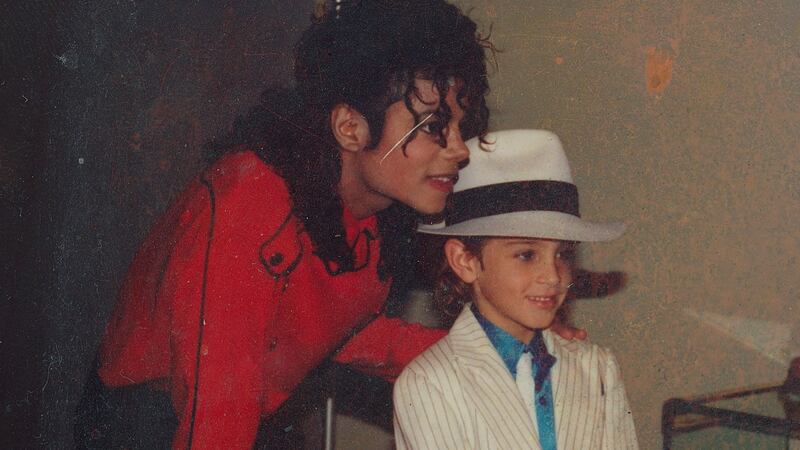
Michael Jackson and Wade Robson in 'Leaving Neverland'
HBO“In this particular environment, creating a safe environment for victims also creates a perfect environment for liars,” he writes, referring to the #MeToo movement.
Rain’s arguments are echoed all across social media, Jackson fan sites, YouTube conspiracy videos, and various truther blogs, like leavingneverlandfacts.com and themichaeljacksonallegations.com.
These fans are always in firing mode, armed and ready with their artillery of rebuttals to any allegation. His close friendship with young boys is excused as the eccentricities of a real-life Peter Pan, whose lost childhood found him more comfortable in the company of those much younger. Any accusers must be motivated by money, a notion emboldened by the fact that the family of the first Jackson accuser, Jordan Chandler, settled out of court for an amount reported to be over $20 million. And besides, Jackson was abused himself as a child, and then prematurely sexualized. (It’s here, perhaps, that empathy conflates with excuse.)
Like those who say that no accuser could be believed, these defenses operate under the same blind assumption that Jackson could never molest or rape. They dismiss the reality that the parents of a victim of sexual abuse may have settled out of court once the reality of facing off against the most famous and influential person in the world presented itself. They fail to rationalize why anyone would subject themselves to the onslaught of attacks and threats to their safety that Safechuck and Robson have weathered after coming forward.
But none of that matters when it comes to their vociferous defense of Michael Jackson.
Fans love to cite the lyrics to Jackson’s 1995 song “Tabloid Junkie” as a way of shaming anyone who reports on Leaving Neverland: “Just because you read it in a magazine / Or see it on the TV screen / Don’t make it factual.” Think of it as “fake news!” as wailed by the King of Pop.
The truthers weaponize these lyrics often. I know because I’ve been hit by it, machine gun-style, by thousands of fans unhappy that I, like many other journalists, have been reporting on Leaving Neverland.
New York Times columnist Maureen Dowd seemed particularly struck by the sheer volume with which Jackson fans would pummel a journalist’s Twitter mentions—commenting on or replying to a tweet—after writing about the documentary, or Robson and Safechuck’s accusations. “MJ truthers are blowing up my mentions for pointing out the obvious: Michael Jackson sexually abused kids for years. Dan Reed, who directed the docu, is also awash in fan outrage. He told me MJ’s victims became numb to this sort of thing long ago,” she wrote, posting screenshots of the most histrionic examples.
Writers from The Huffington Post, Vanity Fair, and several other media organizations also confirmed that their social media accounts were swarmed by truthers after publishing articles about the documentary. Members of The Daily Beast staff who shared our initial Leaving Neverland report also were flooded with messages.
Jackson fans have always been impressive in their ability and willingness to mobilize, but the rise of social media has only made it easier to spread their message.
Influential truther accounts flag reporters and critics who wrote pieces they take particular umbrage with and encourage others to target them with their outrage. (Journalists verified with a “blue check mark” seem to particularly irk them.) Clicking on any of these accounts reveals people who seem to have been spending all day, everyday this past month tweeting and retweeting evidence to support Jackson, as well as criticism of Leaving Neverland, Reed, Robson, Safechuck, and anyone giving them a voice.
The internet has provided convenient access to not only express, but even quantify their anger. When the Leaving Neverland trailer premiered on HBO’s YouTube account, fans posted their displeasure over the project en masse. There are currently over 8,500 comments on the video, which has accrued 1.3 million views: “Ashamed and creeping!” “Wade Robson is not a victim, Wade Robson Is a Liar!” “HBO has officially lost all its credibility.”
YouTube allows users to recommend or dislike videos by clicking a thumbs up or thumbs down icon. The ratio is currently 3,000 thumbs up to more than 14,000 thousand thumbs down. Google has a similar feature for “audience reviews.” Currently, only 17 percent of users have “liked” the movie, and the reviews are scathing—“a disgrace to the art of visual information media,” for example—despite the fact that the documentary has not yet aired or been seen by the public.
When you scan these comments and Twitter messages, there are several points that are highlighted as “definitive proof” of Jackson’s innocence.
There’s this one, for example: a lengthy thread from Twitter user @Hammertonhal, whose entire account is devoted to Leaving Neverland. It’s riveting, though wild stuff—a Twitter-thread version of one of Carrie Matheson’s Homeland walls of clues and photos with push pins and string connecting them all in a vast web.
The major player in these theories is a man named Victor Gutierrez, a Chilean reporter who wrote the book Michael Jackson Was My Lover, which he claimed to have adapted from 1993 Jackson accuser Jordan Chandler’s diary. According to Gutierrez’s entry on themichaeljacksonallegations.com, many found the pro-pedophilia nature of the book disturbing, pointing out that Gutierrez thanks NAMBLA, the North American Man-Boy Love Association, in the book’s foreword. But the Chandlers say that Jordan never kept a diary. Jackson sued Gutierrez for defamation, and won.
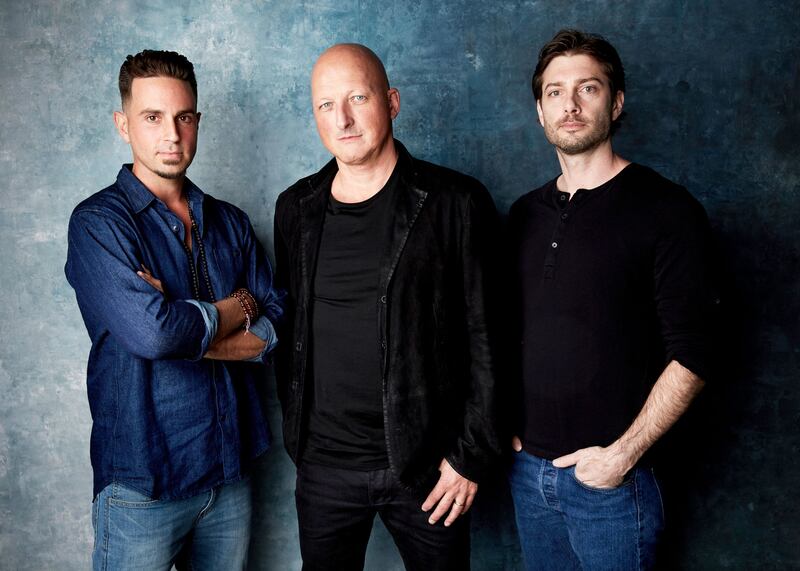
Wade Robson, director Dan Reed, and James Safechuck
Taylor Jewell/APTruthers point to the fact that Gutierrez was a frequent source of reporters Stacy Brown and Diane Dimond, with the latter’s Jackson coverage having appeared on The Daily Beast. Both Brown and Dimond were among the first to report Safechuck’s accusations. These fans noticed similarities in Safechuck’s story to sections of Gutierrez’s book. Their theory is that either Brown or Dimond coached Safechuck on the similar story, or that Safechuck gleaned it from Gutierrez’s book himself. So there’s that.
As for Robson, the fact that he testified under oath in the 2005 trial is obviously one main sticking point, but quotes are also pulled, sans context, from various interviews he’s done in which they claim his “story changed” as to why he waited so long to come forward. More, they like to use the timeline that Robson made his accusations after he wasn’t hired to choreograph and direct the Jackson Cirque du Soleil show ONE as some sort of “gotcha” that he is after money.
A tweet that nephew Taj Jackson sent posting what appears to be a screenshot of Robson requesting tickets for him and his family to attend Jackson’s memorial is often used by these fans as alleged proof that he his relationship with Jackson was always great and he concocted his abuse story when he was cash-strapped.
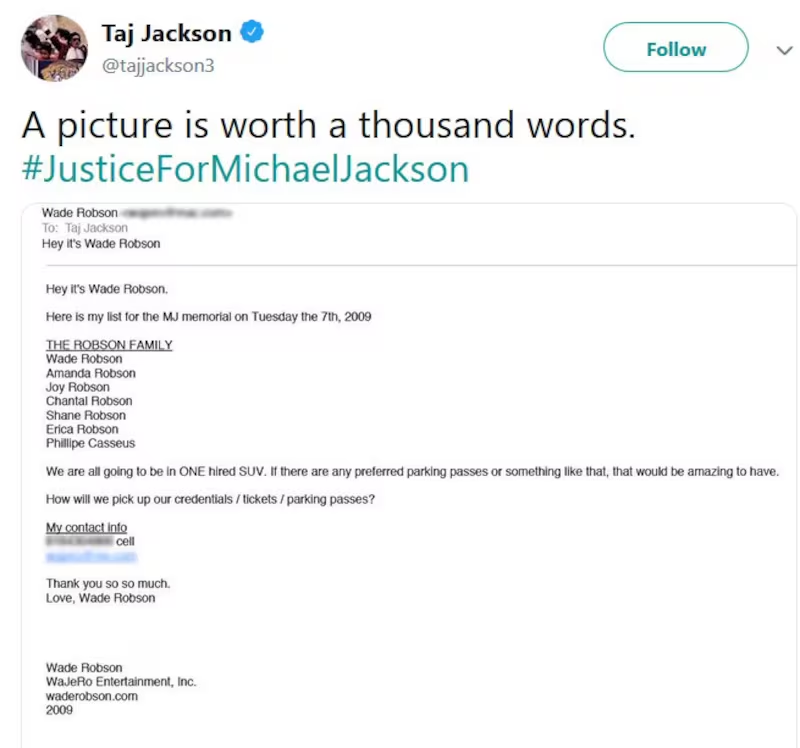
There are pieces—long, exhaustive pieces—that read like manifestos all over the internet, many of them curated on leavingneverlandfacts.com, which seems to be a bit of a hub for the truthers.
Linda Woods’ “The New Lynching of Michael Jackson: Dan Reed’s Leaving Neverland May, In Fact, Leave Blood on Many Hands,” which was posted on Medium (estimated 35-minute read), regurgitates each of those bits of evidence with outraged commentary over why it all isn’t public knowledge. “Why is the ‘woke’ crowd so determinedly asleep at the wheel on this?” she writes. “And an even more troubling question: Why are so many of the most influential journalists in the U.S. and U.K. enabling it?” Woods describes herself as “a writer, scholar, journalist, and all around pop culture geek.”
On his own website, Damien Shields, author of Michael Jackson: Songs & Stories From the Vault, published a similar piece, titled, “What the Media Refuses to Tell You About Michael Jackson, Leaving Neverland & the Allegations of Child Molestation.”
The idea behind both of these pieces, and so many other fan-made YouTube videos and Twitter threads like them, is that there is a trove of evidence connecting every Jackson accuser and their stories to money-grubbing motives, all enabled by complicit, racist journalists eager to take down Jackson and paint him as a monster.
As Shields writes, “The media seems to have forgotten about the presumption of innocence and the burden of proof.”
To make things easier to digest, several of these fans have sent me the same YouTube videos that, in their minds, make the case over and done. Here’s one example: a 30-minute video devoted just to Robson, titled, “Michael Jackson and Wade Robson: The Real Story.”
Of course, none of this information—nor any of these theories, pieces of evidence, or attacks of character—is new to Reed, Safechuck, Robson, or HBO, which is standing behind the documentary in the face of a massive $100 million lawsuit, targeted fan campaign, and outspoken displeasure from the Jackson family. (Though just to be sure, these truthers have been meticulous in tagging their social media handles on every tweet and attack they send.)
On the topic of “facts,” the word that seems to come up most often in all of this, the fact is that the documentary premieres on Sunday night and not one of these people have seen it.
Robson and Safechuck address many of the criticisms in the documentary. Not the wild theories and conspiracies, but why they kept their accusations secret for so long, why they decided to come forward now, and what they hope to get from doing it. (Money is not the answer.)
And as for why he didn’t include a statement from the Jackson estate in the documentary, Reed’s answer, which is certainly open for debate, was given to Oprah Winfrey: “What is the journalistic value of interviewing someone saying, ‘Michael was a really nice guy. He never did anything to a child.’ And that person has a gigantic vested interest, a financial interest, in smearing these two young men?”
These truthers, of course, have no financial interest. So what is it, then?
We reached out to Casey Rain, author of that first piece we mentioned published on his blog, “The Violet Reality.”
He once again called the film “propaganda.” Asked what it is that mobilizes so many people to devote so much time, energy, and passion to come to Jackson’s defense, he said, “Michael was kind, he was charitable, he looked after people, and to see his kind nature repeatedly dragged through the mud by opportunists, extortionists and liars is simply outrageous.”
As for Leaving Neverland, the documentary he wrote an entire essay about and has spent so much time attempting to discredit? No, he has no plans to actually see it.

